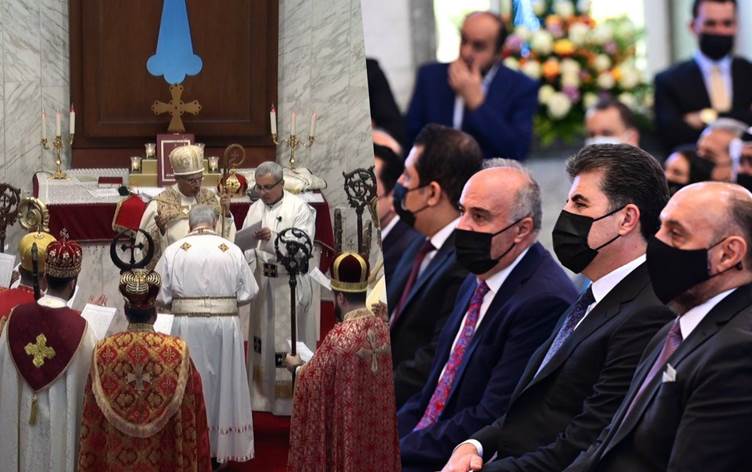
The inauguration of the 122nd patriarch of the Assyrian Church of the East in Erbil, September 13, 2021. Photo by Bilind T. Abdullah/Rudaw
ERBIL, Kurdistan Region - The inauguration of the 122nd patriarch of the Assyrian Church of the East was held in Erbil on Monday. The ceremony was attended by a number of religious figures, as well as government, including the president of the Kurdistan Region.
Mar Awa Royel was inaugurated as the new patriarch of the Assyrian Church of the East in a ceremony held in Erbil’s Ainkawa suburb early in the morning.
President Nechirvan Barzani congratulated the new patriarch and emphasized the importance of religious diversity in Iraq and the Region.
“Coexistence in the Kurdistan Region is a beautiful portrait of all the components living in Kurdistan [Region],” Barzani told reporters following the ceremony.
The “portrait of coexistence” and everyone living together gives Iraq beauty, the president added.
Erbil governor Omed Khoshnaw was also among the attendees.
Royel has previously served as a bishop, presiding over the diocese of California. He was the first American-born bishop of the Assyrian Church of the East. He has also served as secretary of the Holy Synod of the church since 2015.
Royel, who is the successor of Mar Gewargis III Sliwa, was elected in a ceremony held in St. John Baptist Church in Ainkawa on Wednesday.
Gewargis had expressed his intention to step down in February of 2020 due to health reasons, but the election of his successor was delayed because of the coronavirus pandemic. Gewargis welcomed Pope Francis to Erbil in his historic visit to Iraq in March.
In 1933, the seat of the Assyrian Church was moved from the Middle East to the United States. In 2006, construction of a new patriarch began in Erbil and the election of Royel’s predecessor saw the return of the authority of the church to the place of its roots.
There are only a few hundred thousand Christians left in Iraq. Following the US-led invasion of 2003, sectarian warfare prompted followers of Iraq’s multiple Christian denominations to flee, and attacks by the Islamic State group (ISIS) in 2014 hit minority communities especially hard. According to data from Erbil’s Chaldean Archbishop Bashar Warda, there were more than one million Christians in Iraq before 2003. Fewer than 300,000 remain today, many of them reside in the Kurdistan Region.









Comments
Rudaw moderates all comments submitted on our website. We welcome comments which are relevant to the article and encourage further discussion about the issues that matter to you. We also welcome constructive criticism about Rudaw.
To be approved for publication, however, your comments must meet our community guidelines.
We will not tolerate the following: profanity, threats, personal attacks, vulgarity, abuse (such as sexism, racism, homophobia or xenophobia), or commercial or personal promotion.
Comments that do not meet our guidelines will be rejected. Comments are not edited – they are either approved or rejected.
Post a comment